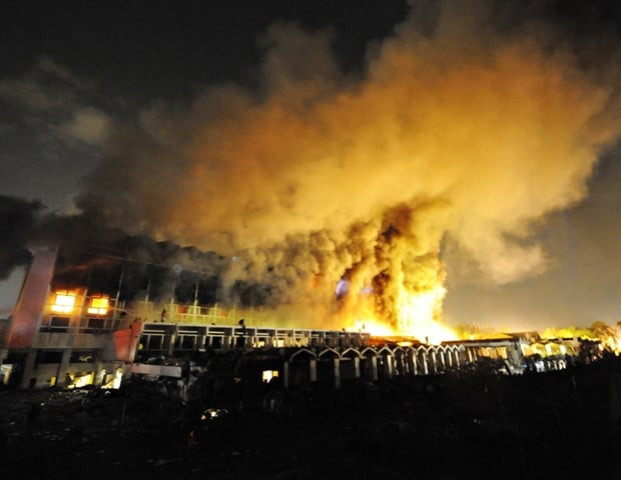Terrorism: Pakistan's 10 years of chaos
The 9/11 attacks that thrust Pakistan into the war on terror have brought the country to its knees.

It was already evening in Pakistan when television channels, recently deregulated by then president General Pervez Musharraf, began broadcasting the terrifying scenes from the twin towers in New York.
Few slept that night, realising immediately that the world had changed forever and that Pakistan was in the eye of the storm after spending years fostering extremist movements for its own ends.
"My immediate thought was 'oh my God, more trouble coming onto Pakistan'," said author Imtiaz Gul, who has written extensively about the subsequent war and its fallout at home.
"My fears have been borne out... The 9/11 events shocked Pakistan into an unprecedented crisis of insecurity," he said.
It didn't take long for Musharraf to weigh up conditions imposed by Washington and announce on September 19 that Pakistan would offer its airspace, territory and capabilities to help the United States defeat terrorism.
But as America put the finishing touches to its war plans, Pakistan desperately tried to persuade its Taliban allies in Afghanistan to give up Osama bin Laden and avert catastrophic military action, to no avail.
Within weeks, Bin Laden, his future successor Ayman al-Zawahiri and Taliban leaders had fled the American invasion into Pakistan.
And there in the northwestern tribal belt, which no government has been able to subjugate, they found refuge among an extremist support network dating back to the 1990s jihad against the Soviets in Afghanistan.
They regrouped, forming bases used by the Taliban to direct the insurgency in Afghanistan and training camps for al Qaeda to brainwash young extremists from all over the world into carrying out terror attacks.
As a result, the last decade has made the country more unstable than ever before in its bloody and chaotic 64-year existence.
The watershed came in July 2007 when government troops cleared out extremists preaching hate from the Red mosque in the heart of the capital Islamabad.
The militants declared war and in the past four years, around 500 bomb attacks have killed 4,600 people, according to an AFP tally.
Just when it appeared things couldn't get worse, this year the US discovered Bin Laden living in Abbottabad, sending in Navy SEALs to kill him and sinking already fractured US-Pakistani relations.
"No doubt that this is absolutely the worst time for the country," said Pakistani journalist Ahmed Rashid, whose book "Taliban" became an international bestseller after 9/11.
Rashid describes Pakistan as "completely isolated" by a war that "brought terrorism, sectarianism, a weakening of the state (and) much greater ethnic insurgencies" within the country.
But the blame, he says, is Pakistan's for frittering away American aid money and refusing to realign its national security priorities.
"Politically, the most far-reaching mistake was the hosting and relaunching of the Afghan Taliban by the military and the intelligence agencies. That was enormously detrimental and led to the growth of the Pakistani Taliban."
Pakistan routinely proclaims to have sacrificed the most of any country fighting terror.
The government claims that 35,000 people have been killed. The army confirms the deaths of 3,019 soldiers since 2001, more than the 2,684 Western soldiers to have died in Afghanistan.
More than three million people have been displaced by violence and counter-terrorism activities in Pakistan since 9/11, according to International Crisis Group figures released in 2010.
The army says 147,000 troops are deployed in the northwest compared to 35,000 in October 2001, a drastic reversal from the previous concentration along the Indian border in the east.
Yet extremism has increased. An average of one US drone strike every four days against militants in the tribal belt is raising fears that the campaign is recruiting a new generation of insurgents and suicide bombers.
Jihadi groups fostered by Pakistan's security establishment to fight India in Kashmir and maintain Afghanistan as a strategic asset have splintered, and increasingly turned the guns on their old allies in the state.
"Pakistan is a lot less secure country now than 10 years ago, because it has become a battleground, an extension of the Afghan war. Pakistan is now facing a serious threat for its stability," said journalist Zahid Hussain.
Yet the public discourse concentrates less on how to defeat militancy than debating the merits of the hugely unpopular US alliance.
Trust between Islamabad and Washington is at an all-time low. Cooperation between the CIA and Pakistan's ISI spy agency is poor. Blame games on both sides are played out in the media.
Compounding the sense of crisis is the country's economic meltdown. Pakistan says losses related to the war are $68 billion. Critics say the country has squandered up to $20 billion in aid given by the United States.
"The biggest mistake was the failure to really address strategic issues in the economy. Pakistan could have changed its very weak economic structure at that point in time," said Rashid.
Instead crippling inflation, rampant unemployment and an energy crisis with power cuts of up to 16 hours a day have left millions wondering how to fill the void.



















COMMENTS
Comments are moderated and generally will be posted if they are on-topic and not abusive.
For more information, please see our Comments FAQ